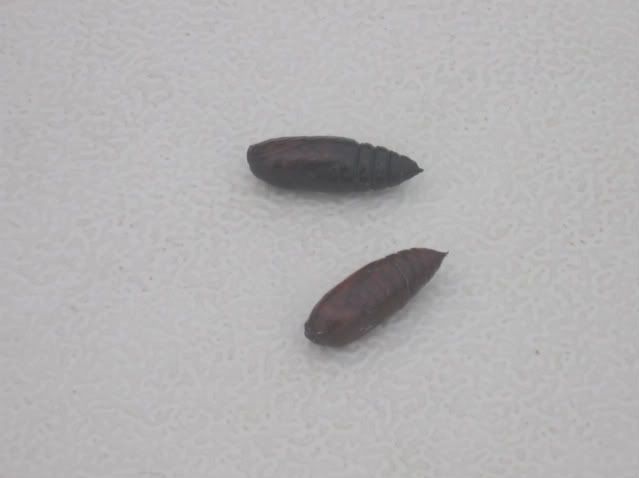
Posted on 05/29/2008 9:31:26 PM PDT by wideminded

Thanks in advance for any identification info.
Sorry. I forgot to add “(Vanity)” to the title.
This might sound amazing but I’ve found similar objects in my cat’s litter box!
Those are moth cocoons
You found two elements of Obama’s ideology. Currently in deep hibernation, upon his election they will blossom into huge radical-left moths.
I think what you have is a chrysalis of a tomato worm. Check out this link.
http://www.whatsthatbug.com/tomato.html
Put 'em in a jar, and wait.
Were they anywhere within a few feet from a tree? If yes, and they were down a few inches, they might be cicadas.... just a guess.
Have fun but offer any help you can. Alright?
larvae,, A little insecticide later on will take care of the worms ,,, not sure witch ones ,,
Yup. Pupas.
Alien pods. Call Art Bell.
It sort of looks like early development of a cockroach based on this, but I’m really not sure.
They look like pupae to me, of what I do not know.
I used to find greasy fat white things in my garden dirt, I hated them.
And here I thought it was a political forum.
Unless maybe those are DEMOCRAT PUPAE.
Cicada bugs will again return to a return to a number of states in 2008. Also called the “17 year locust”, Cicada insects, or bugs, arrive by the millions, and can do damage to a variety of young trees and shrubs in your yard.
Our advice to gardeners and homeowners in affected areas, is to cover up your young trees and shrubs. The best protection is pest netting with a 1/4” mesh. The 2008 Brood will affect over a dozen states. They are: KY, GA, IN, MA, MD, NC, NJ, NY, OH, PA, TN, VA, WV Buy Pest Netting
Most, but not all years, a Cicada brood hatches, affecting anywhere from a small area to several states or more. When a particular brood matures and emerges, it is usually in many millions of insects. Fortunately, their adult life span above ground is very brief, lasting about four to six weeks.
Cicada is a flying, plant sucking insect that emerges in periodic cycles. Cicada nymphs suck juices from roots of plants. Egg laying females cause significant damage to trees during their brief, adult stage. They are not harmful to humans. Counter to some rumors, they do not bite, nor do they often land on a human or animal.
I have them too- when I smash them with a shovel I feel a lot better. I thought that they might be related to grubs.
remember the cicada invasion of ‘87. holy cow! that was bad.
Disclaimer: Opinions posted on Free Republic are those of the individual posters and do not necessarily represent the opinion of Free Republic or its management. All materials posted herein are protected by copyright law and the exemption for fair use of copyrighted works.